My brother, like me, is deeply attached to the increasingly distant past that we share. That’s one of the reasons why he and my sister-in-law live in the house where the two of us grew up, and why they have jointly preserved so many homely but cherished souvenirs of our childhood. Among them is a stack of tarnished cans of eight-millimeter film that was shot by my father, a longtime camera bug who first became interested in home movies shortly after I was born in February of 1956. He bought a movie camera that summer, and spent the following decade recording brief snippets of our family life.
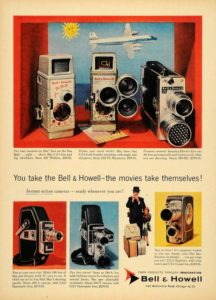 The last time I saw my father’s home movies was in 1990, when I screened them as part of my research for a memoir of my small-town days in which they would figure prominently:
The last time I saw my father’s home movies was in 1990, when I screened them as part of my research for a memoir of my small-town days in which they would figure prominently:
For ten years, he carted his gray Bell & Howell camera to family gatherings of every description. At regular intervals, he arranged his three-minute reels of film in chronological order, fitted them out with carefully typed title cards (“Introducing…TERENCE ALAN TEACHOUT”), and spliced them end to end into half-hour programs….
We drag them out and watch them every year or so, laughing and pointing and passing a bowl of my mother’s greasy, salty popcorn from hand to hand. Not all of them are funny. The earliest reels, taken before my father had quite figured out how to work his new camera, are full of oddly haunting glimpses of long-forgotten things: an open field, a country church, a birdhouse, a garden. Even the familiar scenes are lightly touched with mystery, for my father stopped making movies when I was ten years old, and I cannot remember any of the actual occasions on which he shot them. I know that I am the child on the flickering screen because I remember the Christmas toys that surround me: the two-story service station, the red International Harvester tractor, the wheezing toy organ that sits on a table in the basement, still playable, still out of tune. I was there, but I cannot remember a single one of these three-minute snippets of lost time preserved so faithfully by Eastman Kodak that my mother and father and I can watch them in our living room thirty years after the fact.
By then my father was well on the way to his brief, uneasy retirement, and his health was starting to fail. He had never been one for nostalgia, for his own childhood was unhappy and unsettled, and he was no more inclined to reminiscence than he was willing to talk about the world war in which he had served. After he died, my mother showed no interest in looking at his movies, just as she stopped listening to the big-band music that he (and I) loved. Both, I suppose, reminded her too strongly of that which she had lost.
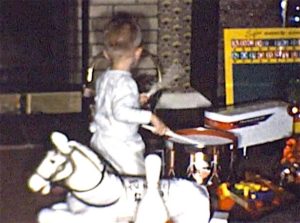 Eight-millimeter home movies have long since become moldy antiques. Indeed, movie film itself is on the far verge of extinction. The generation that followed mine was suckled on home video, while my millennial friends use smartphones to chronicle their lives. You no longer have to buy three-minute reels of film at the drugstore, then ship them off to Kodak to be processed. Today everything is instantaneous and ubiquitous, which to my mind diminishes its preciousness. The easier it is for us to do something, the more we take it for granted—and the less we value it.
Eight-millimeter home movies have long since become moldy antiques. Indeed, movie film itself is on the far verge of extinction. The generation that followed mine was suckled on home video, while my millennial friends use smartphones to chronicle their lives. You no longer have to buy three-minute reels of film at the drugstore, then ship them off to Kodak to be processed. Today everything is instantaneous and ubiquitous, which to my mind diminishes its preciousness. The easier it is for us to do something, the more we take it for granted—and the less we value it.
All of which brings us back to my brother David. A few days ago he sent me a box containing a metal tin of Christmas cookies that he and Lauren, my niece, had baked together in what used to be my mother’s kitchen, using her old recipe. It also contained an unlabeled thumb drive. No sooner did I find it at the very bottom of the box than I inserted it in my laptop, knowing that David has a penchant for sentimental surprises and suspecting at once what this one was.
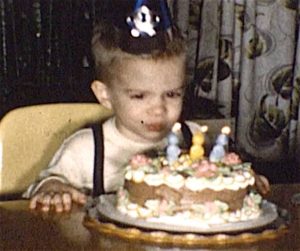 Sure enough, the drive contained my father’s home movies, converted to three and a half hours’ worth of digital files, faded with age and devoid of sound (yes, home movies were silent when I was a boy) but enthralling all the same. Each scene was as familiar to me as the face I see in the bathroom mirror—yet strange, too, even more so than when I’d last watched my father’s movies a quarter-century ago.
Sure enough, the drive contained my father’s home movies, converted to three and a half hours’ worth of digital files, faded with age and devoid of sound (yes, home movies were silent when I was a boy) but enthralling all the same. Each scene was as familiar to me as the face I see in the bathroom mirror—yet strange, too, even more so than when I’d last watched my father’s movies a quarter-century ago.
The difference is easily explained: my parents are dead now. So is everyone in my father’s family. So are my mother’s parents, and all but one of her siblings. And so, of course, is the simpler, less knowing world of my youth that is enshrined in those faded movies, the self-confident age of Eisenhower and Kennedy, of three TV networks and tuna casserole with crumbled potato chips on top, of films and newspapers and Books of the Month that everyone saw, read, and believed. It lives only in memory, and on the screen of my MacBook.
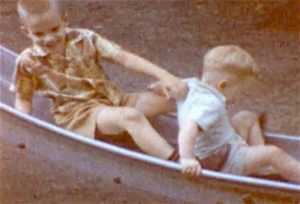 Memories are especially important at this time of year, to me and, I suspect, to most people who have put youth behind them. “‘I miss.’ That sums up Christmas for me.” So said a thirty-nine-year-old friend of mine the other day, and I knew what she meant. How could I not? I miss my mother and father. I miss my aunts and uncles. I miss the old wooden swing on the porch of my grandmother’s house. I miss the Christmas presents and sliding boards and carefree vacations that my father loved to film. I miss the shadowless summer afternoons (“Summer afternoon—summer afternoon; to me those have always been the two most beautiful words in the English language,” Henry James once said to Edith Wharton) when there was nothing to worry about, when my parents did the worrying behind my back and let me assume that all was right with the world.
Memories are especially important at this time of year, to me and, I suspect, to most people who have put youth behind them. “‘I miss.’ That sums up Christmas for me.” So said a thirty-nine-year-old friend of mine the other day, and I knew what she meant. How could I not? I miss my mother and father. I miss my aunts and uncles. I miss the old wooden swing on the porch of my grandmother’s house. I miss the Christmas presents and sliding boards and carefree vacations that my father loved to film. I miss the shadowless summer afternoons (“Summer afternoon—summer afternoon; to me those have always been the two most beautiful words in the English language,” Henry James once said to Edith Wharton) when there was nothing to worry about, when my parents did the worrying behind my back and let me assume that all was right with the world.
For a long time I returned each Christmas to Smalltown, U.S.A. I slept in my old bedroom, ate my mother’s cooking, and pretended, even after my father died, that nothing had changed, even though I knew perfectly well that everything had changed. But my mother was growing steadily older and more frail, and by the time of my last Christmas visit, she was tired of life and sick unto death.
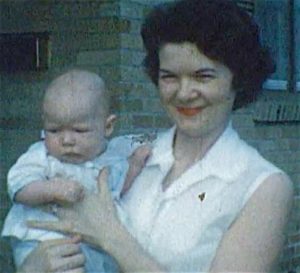 That was five Christmases ago. Since then, December has been for me what Dave Frishberg called “the difficult season” in a song that now speaks to me as it has always spoken for those whose childhoods were, unlike mine, dark and troubled: The tinsel, the reindeer, the chimney, the sleigh/Are the innocent dreams of an innocent day/We hark to the carols meek and mild/Awaking the memories of yesterday’s child. Fortunately, my father captured some of those innocent dreams on film, and thanks to David, I can watch them flicker once again to fleeting life.
That was five Christmases ago. Since then, December has been for me what Dave Frishberg called “the difficult season” in a song that now speaks to me as it has always spoken for those whose childhoods were, unlike mine, dark and troubled: The tinsel, the reindeer, the chimney, the sleigh/Are the innocent dreams of an innocent day/We hark to the carols meek and mild/Awaking the memories of yesterday’s child. Fortunately, my father captured some of those innocent dreams on film, and thanks to David, I can watch them flicker once again to fleeting life.
To have had a happy childhood is the greatest of gifts, a permanent source of comfort and inspiration. I need no home movies to drink from that self-renewing source, but I’m still lucky to have them—and to have a brother to whom they mean as much as they do to me.


